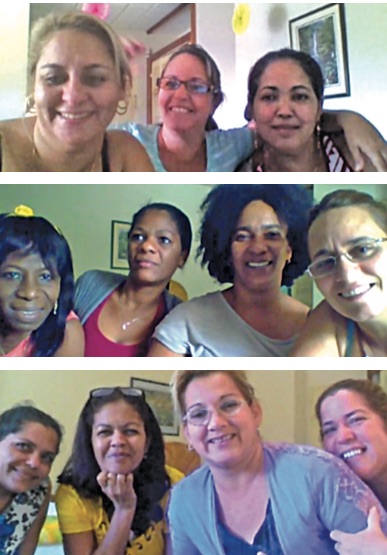The Centre for Language Learning (CLL) at UWI St Augustine successfully conducted a specialised 40-hour English language training course for 11 Cuban healthcare professionals contracted by the Ministry of Health of Trinidad and Tobago. The course was delivered online from May 7 to 16, coinciding with the nurses’ 14-day quarantine period. The training sought to improve their ability to communicate with speakers of Trinidadian English in a medical context.
“The nurses are professionals in their field but needed to strengthen their usage of English language,” says Dr Amina Ibrahim-Ali, Coordinator of English as a Second Language (ESL) at the CLL.

Dr Ibrahim-Ali and ESL tutor Ms Natalie Bhawanie were responsible for the course development and teaching of the nurses. Over the two-week programme, the students were oriented to T&T culture through the use of locally produced materials for English for medical purposes, which is a subset of English for specific purposes (ESP) learning.
CLL has considerable experience in teaching foreign medical professionals. In 2009, they trained over 120 Cuban doctors and nurses in English. In 2010, they trained another 70 to 80 Cuban nurses.
“We were teaching them medical English,” says Ms Bhawanie. “Our focus was on extending their knowledge of vocabulary, pronunciation and grammar. We incorporated that with listening and speaking activities.”
The objectives of the course included:
Dr Ibrahim-Ali said they placed importance on boosting the nurses’ confidence and making them feel accepted:
“We had to make the course culturally relevant. I would use Toco, David Rudder in our classes. I introduced them to “Trini to d’ Bone” and one of them got up and danced. I asked them ‘where is Maracas Bay?’, ‘what is shark and bake?’ You have to orient them to the country to make them feel comfortable. You have to make them feel welcome.”
CLL has considerable experience in teaching foreign medical professionals. In 2009, they trained over 120 Cuban doctors and nurses in English. In 2010, they trained another 70 to 80 Cuban nurses. Ibrahim-Ali and her colleagues at CLL have published research papers based off of these teaching exercises.
CLL has considerable experience in teaching foreign medical professionals. In 2009, they trained over 120 Cuban doctors and nurses in English. In 2010, they trained another 70 to 80 Cuban nurses. Ibrahim-Ali and her colleagues at CLL have published research papers based off of these teaching exercises.

At the conclusion of the course, the nurses were asked to evaluate the training and all reported that it had helped them develop their competence, knowledge and confidence in English. The near complete satisfaction expressed by the group served as an excellent reward for the effort and time invested by the CLL team.
“They were so gracious and grateful,” said Ibrahim-Ali about the nurses. “We enjoyed the experience immensely. It’s always lovely to give people currency that they can take up and use. That’s how we view the English language.”
When asked how it felt to have contributed to the national effort against COVID-19, Ms Bhawanie laughed:
“I didn’t think of it like that. Teaching is like second nature to me. I come from a family of teachers. I am glad to be able to help yes, but at the same time it’s always fulfilling for me to be able to teach.”